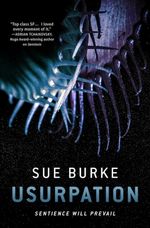Usurpation
Sue Burke
★★★★☆
Usurpation is a very different book than the two that preceded it. It’s set entirely on Earth, for one thing, and for another it deals with people and violence on a much larger scale. The human colony on Pax is too small to afford people killing each other, but the opening scene here has a bystander getting brutally caught up in a murder. Interference had a slow-motion war between two plant ecosystems. Usurpation has international wars in which cities are firebombed off the map.
And there are multiple sentient bamboo groves, each with her own personality, not just one.
A century has passed since the epilogue, and humans have incorporated rainbow bamboo and fippokats into their cities, gardens and greenbelts worldwide, though they still haven’t quite tumbled to how intelligent either are. Nature is healing from the injuries that prompted the colonists to leave for Pax in the first place, and humanity is rebounding from the global fascist state that sent the follow-up expedition. NVA hasn’t quite been forgotten, though, as some people honor “Envia” as the goddess of suffering. And some nations are freer than others.
Even more than the previous books it’s about who counts as a person, and what happens on the far side of where you draw the line, as seen from human, cetacean, bamboo, robot and even fippokat perspectives. Two Bamboo groves try to get fippokats to fight a proxy war. A group of fippokats uses a squirrel as bait. Robots prefer the humans who will let them perform their functions over the humans who won’t. And of course we already know humans will try to manipulate those they consider inferior.
The second half of the book is primarily a plague story, focusing on a disease that infects both humans and bamboo, hijacking their nervous systems like the fungus that takes over ants. It adds another wrinkle to the “who’s really a person?” question, when you have something interfering with the link between who you are and what you do at such a fundamental level.
The plague story itself is less satisfying than the stories that weave into and out of it. I disagree with the low ratings I’ve seen on Bookwyrm, though. I’d only rate it slightly below Interference, rounding them both to four stars.
More info at Usurpation.
